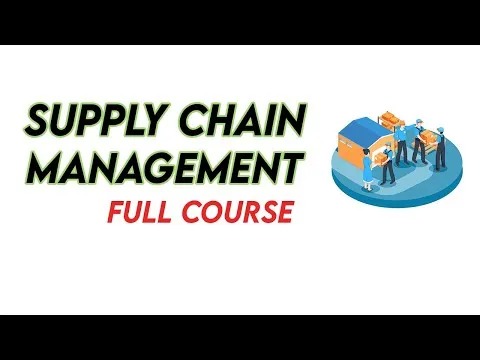
Supply Chain Operations 
This course introduces the essential process improvement tools of Supply Chain Operations. Through the Six Sigma methodology and Lean philosophy, students will gain the knowledge to eliminate waste and make processes more efficient. No prior experience is necessary, but a basic understanding of business concepts, spreadsheets, and Supply Chain Logistics is beneficial. Join us and learn how to improve processes and achieve perfection. ▼
ADVERTISEMENT
Course Feature
![]() Cost:
Cost:
Free
![]() Provider:
Provider:
Coursera
![]() Certificate:
Certificate:
Paid Certification
![]() Language:
Language:
English
![]() Start Date:
Start Date:
17th Jul, 2023
Course Overview
❗The content presented here is sourced directly from Coursera platform. For comprehensive course details, including enrollment information, simply click on the 'Go to class' link on our website.
Updated in [March 06th, 2023]
This Supply Chain Operations course provides an introduction to the essential process improvement tools used to achieve perfection. Students will learn the Six Sigma methodology for process improvement, the Lean philosophy for eliminating waste, and how to apply the tools to improve a process of their own. No prior background in operations is required, but a basic understanding of business concepts, a working knowledge of spreadsheets, and ideally mastery of the Supply Chain Logistics course is beneficial. Upon completion of the course, students will be able to apply the tools they have learned to improve a process of their own.
[Applications]
Upon completion of the Supply Chain Operations course, students will be able to apply the Six Sigma methodology for process improvement, demonstrate an understanding of the Lean philosophy, and apply the tools they have learned to improve a process of their own. Students will be able to apply the knowledge they have gained to their own business operations, as well as to the operations of other businesses. Additionally, students will be able to use the tools they have learned to identify areas of improvement and develop strategies to increase efficiency and reduce waste.
[Career Paths]
1. Supply Chain Manager: Supply chain managers are responsible for overseeing the entire supply chain process, from procurement to delivery. They must ensure that the supply chain is efficient and cost-effective, while also meeting customer demands. They must also be able to identify and address any issues that arise in the supply chain. As the demand for efficient supply chain operations increases, the need for supply chain managers is expected to grow.
2. Logistics Analyst: Logistics analysts are responsible for analyzing and optimizing the supply chain process. They must be able to identify areas of improvement and develop strategies to improve the efficiency of the supply chain. They must also be able to analyze data and make decisions based on their findings. As the demand for efficient supply chain operations increases, the need for logistics analysts is expected to grow.
3. Supply Chain Consultant: Supply chain consultants are responsible for providing advice and guidance to companies on how to improve their supply chain operations. They must be able to identify areas of improvement and develop strategies to improve the efficiency of the supply chain. They must also be able to analyze data and make decisions based on their findings. As the demand for efficient supply chain operations increases, the need for supply chain consultants is expected to grow.
4. Supply Chain Analyst: Supply chain analysts are responsible for analyzing and optimizing the supply chain process. They must be able to identify areas of improvement and develop strategies to improve the efficiency of the supply chain. They must also be able to analyze data and make decisions based on their findings. As the demand for efficient supply chain operations increases, the need for supply chain analysts is expected to grow.
[Education Paths]
Recommended Degree Paths:
1. Bachelor of Science in Supply Chain Management: This degree program provides students with a comprehensive understanding of the supply chain process, from procurement and production to distribution and customer service. Students learn how to analyze and optimize supply chain operations, develop strategies for cost reduction, and use technology to improve efficiency. This degree is becoming increasingly popular as companies look to streamline their operations and become more competitive in the global market.
2. Master of Science in Logistics and Supply Chain Management: This degree program focuses on the management of the entire supply chain process, from procurement and production to distribution and customer service. Students learn how to analyze and optimize supply chain operations, develop strategies for cost reduction, and use technology to improve efficiency. This degree is becoming increasingly popular as companies look to streamline their operations and become more competitive in the global market.
3. Master of Business Administration in Supply Chain Management: This degree program provides students with a comprehensive understanding of the supply chain process, from procurement and production to distribution and customer service. Students learn how to analyze and optimize supply chain operations, develop strategies for cost reduction, and use technology to improve efficiency. This degree is becoming increasingly popular as companies look to streamline their operations and become more competitive in the global market.
4. Doctor of Philosophy in Supply Chain Management: This degree program provides students with a comprehensive understanding of the supply chain process, from procurement and production to distribution and customer service. Students learn how to analyze and optimize supply chain operations, develop strategies for cost reduction, and use technology to improve efficiency. This degree is becoming increasingly popular as companies look to streamline their operations and become more competitive in the global market. Additionally, this degree program provides students with the opportunity to conduct research in the field of supply chain management, which can lead to the development of new technologies and processes that can further improve the efficiency of supply chain operations.
Course Syllabus
Lean Operations and Theory of Constraints
Welcome to the exciting world of operations! This module introduces you to the professor who is teaching the courses in the Supply Chain Management Specialization. You will also discover the essential tools that help make operations better. By the end of this module, you'll know what to expect in the course and hopefully be as excited to learn about Supply Chain Operations as I will be to teach you. In addition, you will understand the major goals of optimizing Operations. You will also be able to recall the major foundations of Lean Thinking and the Theory of Constraints.Lean Inventory
In Lean Inventory, we will focus on the application of lean principles to a core concern of Supply Chain Management - Inventory. By the end of this module, you'll know how to calculate the Economic Order Quantity, which is an popular method of managing inventory. In addition, you will be able to quantify the uncertainty of demand and logistical execution to select the right level of safety stock. Finally, you will be able to determine the size of a Kanban bin by calculating lead-time-demand.Six Sigma
Six Sigma is an overview of the Six Sigma Quality System. We start by reviewing the different quality systems that were popular in the past. The main takeaway is an understanding of the DMAIC methodology. By the end of this module, you will be able to apply the DMAIC methodology to improve a process.Lean Six Sigma
In Lean Six Sigma, you will apply all the tools you learned in this course to a project of your choosing. You will be able to show that you not only mastered the lean tools, but also the six sigma methodology to improve processes. After completing this module, you will not only have a better process, but also the ability to improve any process in a systematic manner.Pros & Cons

Excellent teaching

Gave great insight on six sigma principles

Well organised

Detail explanation by professor

Systematic way of teaching

More technical content needed

Quiz 2 difficult to answer

Safety stock calculations not possible

Feedback from qualified teacher needed

Excel answers not accepted
Course Provider

Provider Coursera's Stats at AZClass
Supply Chain Operations introduces essential process improvement tools for supply chain operations. Through the Six Sigma methodology and Lean philosophy, students will gain the knowledge to eliminate waste and improve process efficiency. No prior experience is necessary, but a basic understanding of business concepts, spreadsheets, and supply chain logistics is beneficial. In this course, learners will understand the Six Sigma methodology and how it can be applied to improve processes. They will learn the different phases of the Six Sigma process such as define, measure, analyze, improve and control. They will also learn how to use data to identify areas for improvement, and how to develop and implement solutions.
Discussion and Reviews
0.0 (Based on 0 reviews)
Explore Similar Online Courses

Javascript Essentials

Object-Oriented PHP Basics Course

Python for Informatics: Exploring Information

Social Network Analysis

Introduction to Systematic Review and Meta-Analysis

The Analytics Edge

DCO042 - Python For Informatics

Causal Diagrams: Draw Your Assumptions Before Your Conclusions

Whole genome sequencing of bacterial genomes - tools and applications

MIT Free Supply Chain Management Courses

What Are Good Supply Chain Certifications?


Start your review of Supply Chain Operations